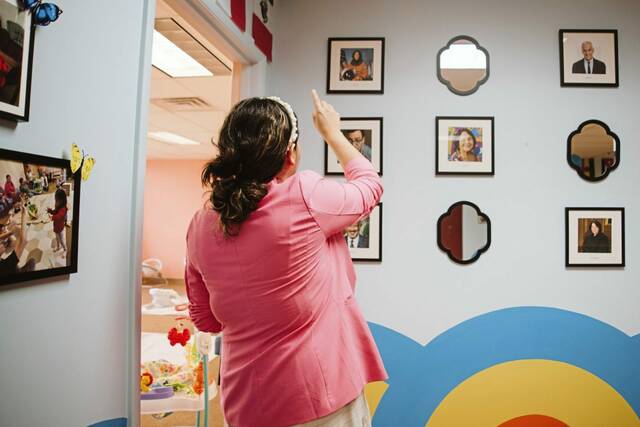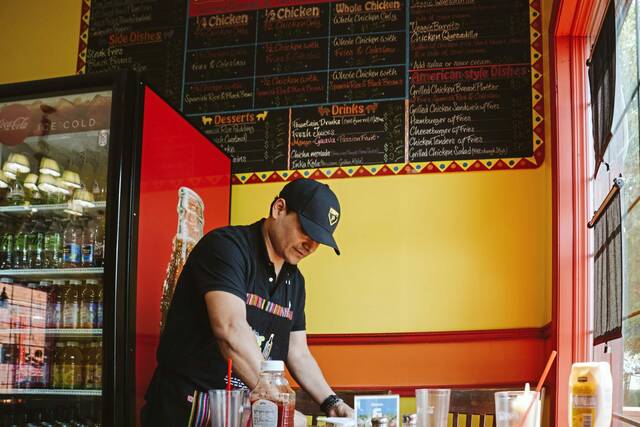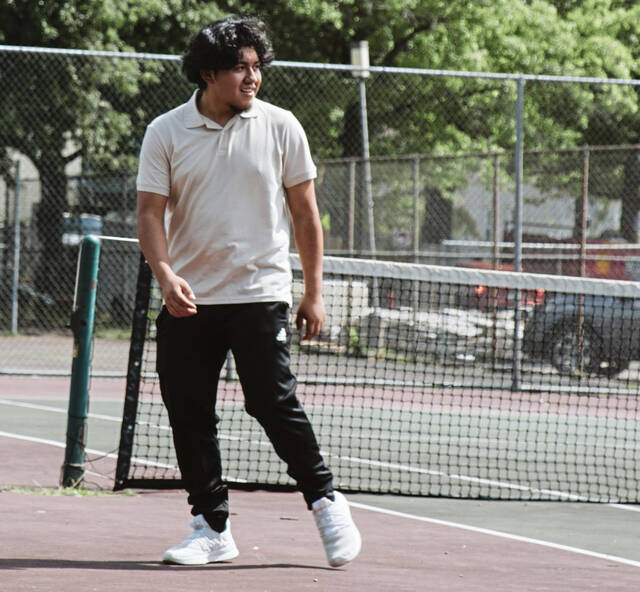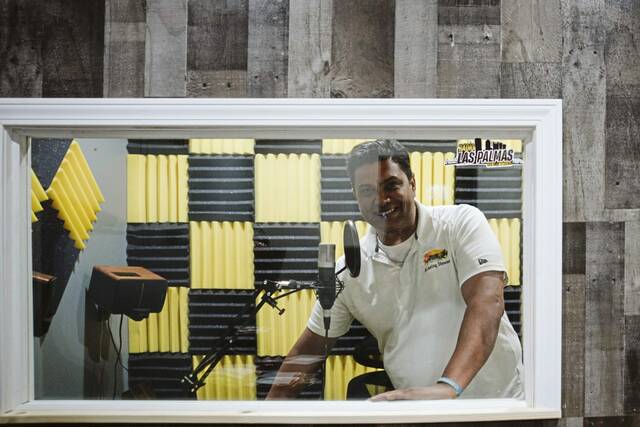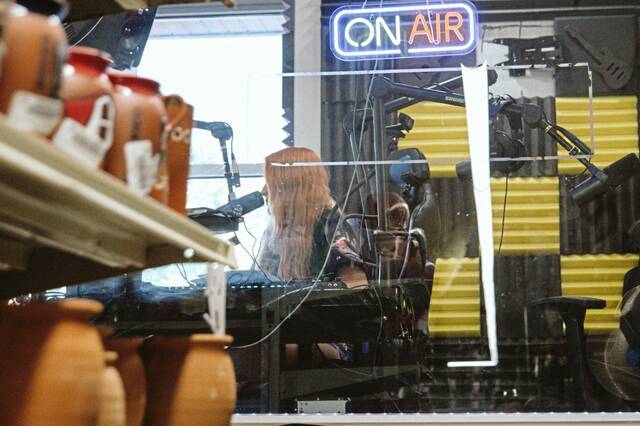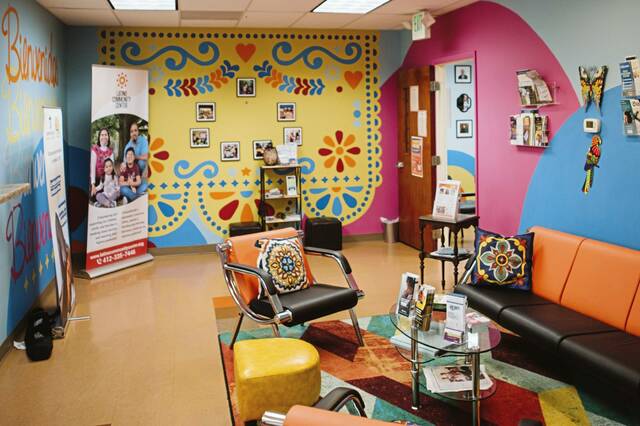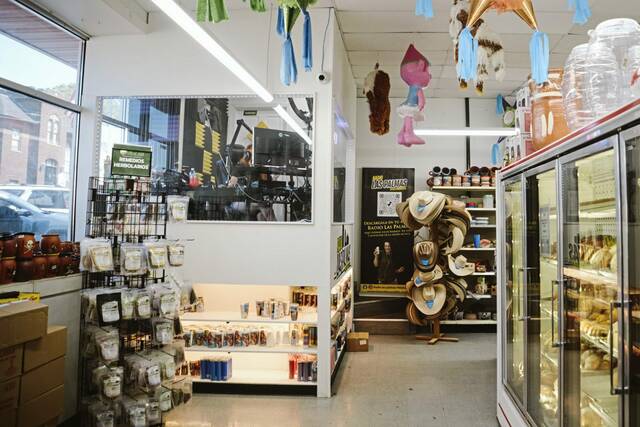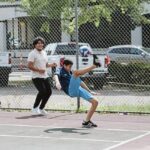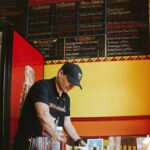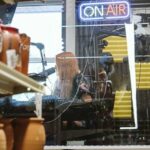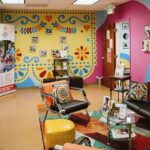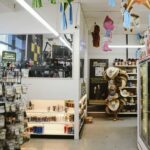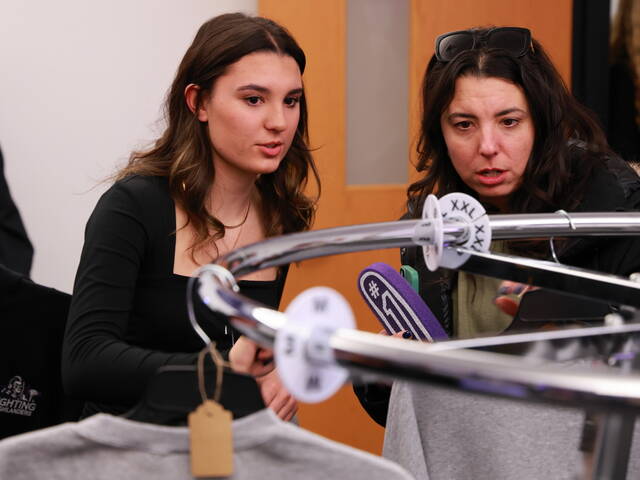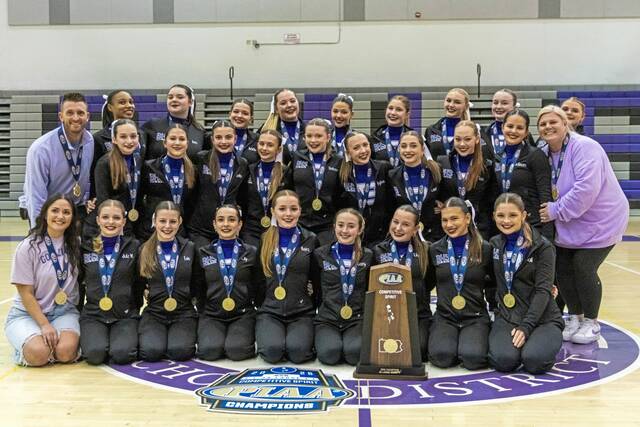A politically persecuted Venezuelan journalist reinvented himself as a Pittsburgh-based Spanish radio show host. A boy whose family was ripped apart by deportation decided to dedicate his life to helping the Latino community that supported him. A woman worked to provide immigrant children better opportunities than she had as a young girl living in the United States. A former business owner fled gang intimidation and found refuge working in a Peruvian restaurant in Beechview.
There is no uniform Latino immigrant experience. Documented and undocumented, lifelong residents and recent arrivals, there is a wide spectrum to the Latino experience in Western Pennsylvania. Many are building the infrastructure they wished had been here to greet them when they first came to the region.
Manuel Manuel-Moya, Spanish radio show host
A Spanish radio show is uniquely headquartered and produced from inside the Las Palmas grocery store in Beechview, where piñatas hang from the ceiling and employees chat with customers. Shoppers can see the studio above the supermarket through a window and watch guests swivel in their chairs and chat before cueing the next Latino pop song.
Las Palmas Radio is the first Spanish radio show in Pittsburgh. Its tagline is “Hablamos tu idioma,” or “We speak your language.”
Manuel Manuel-Moya, of Wexford, created the radio show nine months ago with the help of the owners of Las Palmas. They had considered making a radio show for years, and Manuel-Moya provided the expertise to execute their vision. Originally a journalist in Venezuela, he fled due to political persecution. He landed in Texas and was a radio personality and influencer in Dallas for six years. When his father passed away in Venezuela, he became depressed and visited a friend in Pittsburgh to do some soul-searching. What started as a three-month visit turned into three years as Manuel-Moya put down roots in Pittsburgh. Accustomed to Texas where Spanish media is the norm, he launched a Spanish radio show for Latinos in Pittsburgh.
In a TribLive interview conducted in Spanish, Manuel-Moya said it’s a blessing to still do journalism, albeit in a different form, because he can connect with people in their language. He loves the U.S. because it’s a multicultural country full of opportunities. Although he can’t speak English well, he said, he loves the way it sounds.
Manuel-Moya doesn’t regret his decision to speak out against the corrupt political leaders of Venezuela, although it means he couldn’t visit his father before his death and has a nephew he’s never met. He is sure if he ever has the opportunity to go back to Venezuela there will be family members he won’t recognize. However, he insists, it’s what he needed to say in the moment — it was about his values.
Maria Manautou-Matos, president and founder of Presente Pittsburgh Media, the publisher of Pittsburgh Latino Magazine, loves the new radio show. She likes that it’s inside the grocery store so people can see it while they shop, and appreciates its diverse music options.
“They have reggaeton, salsa, merengue, an interview show on Tuesdays and a Christian-type show for people who like that,” Manautou-Matos said. “I think it’s neat how people are having more options now than ever before.”
Edgar Solis, student turned advocate
Edgar Solis, 18, of Brookline, was Pittsburgh-born, Mexico-raised. As a young child, he remembers when his mom was deported to Mexico. He spent some time with his father in Pittsburgh, but it soon became too much to take care of Solis and work full-time to send money back to his family, so his father made the difficult decision to send his son to his mom in Mexico. When Solis was 3, his mom reunited with her husband in the U.S., but had to leave her son with his grandparents.
Solis spent his childhood in Sultepec, Mexico.
“When I was little, the kids would make fun of me because my parents were gone,” Solis said.
When Solis was 12 years old, his parents decided it was time for their son to join them in Pittsburgh.
“They heard rumors that when Donald Trump took office it was possible he would pass a law that would remove U.S. status from people like me who were in Mexico,” Solis said.
Many help centers told his parents it would be difficult to bring Solis back. The Latino Community Center, a non-profit in East Liberty, offered aid that other help centers couldn’t provide. The founder of the LCC, Rosamaria Cristello, worked with Solis’ parents for a year until all the requirements were met to bring him back to the United States.
Upon returning to Pittsburgh, Solis struggled with behavioral problems in middle school. When it was time to start high school, his mom asked members of the Latino community if there were options for her son other than Brashear High School, where they lived.
The LCC told Solis’ mom about scholarship opportunities at Seton LaSalle Catholic High School in Mt. Lebanon, where he ultimately enrolled.
“There, my behavior went from a bad to a good person,” Solis said.
Solis credits the influence of the LCC, which told him that unless he changed his behavioral problems, he would lose his scholarship. He was also inspired by the religion classes at Seton LaSalle.
“They taught us how we should give back to the community,” Solis said.
Upon graduating from Seton LaSalle, Solis told Cristello that he knew what he wanted to do with his life — come back to the center and help her. Solis asked Cristello if it would be more beneficial to the non-profit for him to study political science or business in college.
Solis recognizes his immigration story is different from a lot of Latino immigrants in Pittsburgh. Volunteering at Soy Pittsburgh, a summer camp run by the Latino Community Center, he looked out at the park full of kids playing soccer and enjoying swing sets.
“My story is different from theirs,” he said. “A lot of kids weren’t born here, so they can get deported at any time. It’s hard for them. I think being born in Pittsburgh changed my life.”
Rosamaria Cristello, mentor and community leader
Cristello came to the U.S. from Guatemala when she was 8 months old and grew up undocumented in Arlington, Va. Her family’s immigration lawyer was well-intentioned, but misinformed Cristello’s family, which led to her family visiting Guatemala, unaware they would not be able to reenter the country.
“It really just broke my parents’ marriage because there was no support to guide them through,” Cristello said.
As an adult, Cristello found herself in Pittsburgh as an AmeriCorps member helping Spanish-speaking refugee families resettle.
“I started to realize that these families are just like mine — that little girl is just like me,” Cristello said.
She started piecing together her vision for a Latino Community Center to provide the wraparound support she wished had existed for her family.
“I don’t really feel like people asked about me, and I remember that,” Cristello said. “I want to make sure all of our kids know no matter what, we’re keeping an eye on them.”
Cristello started by helping where she could.
While women were in the kitchen making tamales, Cristello said, she’d be in there helping people with FAFSA (the application for federal student aid).
Now the LCC serves 2,000 families a year. The bright and cheerful building is decorated with murals by Alison Zapata, photos of parent graduations and a “Wall of Inspiration,” complete with photos of Latino political and cultural leaders such as Selena, Roberto Clemente and Miguel Cardona, the current U.S. secretary of education
“We have a mirror so the kids can see themselves as part of it,” Cristello said. “It’s the sweetest thing to see them on tiptoes trying to see themselves.”
The center also has some confidential rooms for parents being reunited with their kids in foster care.
“Families experience their brightest and happiest moments here, but also some of their hardest,” Cristello said. “We’re here for both.”
Before the facility became a community center, it was a juvenile and adult probation facility. A former employee of the probation facility came to visit the newly renovated space.
“They said, ‘Wow, this space looks so different now. There’s life in here,’ ” Cristello said.
Eric Carlos Trujillo, restaurant worker searching for security
Wiping tables and taking orders at his cousin’s Peruvian restaurant in Beechview was never the plan for Eric Carlos Trujillo, 38, of Beechview. Originally from Cuzco in Peru, Trujillo was a business owner with a family. He worked as a chicken and egg distributor for local restaurants.
When gang members started to threaten his company and the safety of his family, Trujillo turned to the police. In a TribLive interview conducted in Spanish, Trujillo said the police were corrupt and did nothing to protect him.
Left with no other option, Trujillo abandoned everything to seek security in the U.S. He was forced to leave his family behind. Now he works at Chicken Latino, a Peruvian restaurant in Beechview.
He’s proud of his country, especially its landmark, Machu Picchu, but if he could change anything about Peru, he’d change the politics. When asked about his life in the U.S., he said he appreciates that the police have control and that the city of Pittsburgh is organized.
However, he said he struggles to fit in — while there are many Latinos in Pittsburgh, there are very few Peruvians. Learning the language is difficult, and he sometimes feels that Americans view immigrants as cheap labor, or worse, trash.



